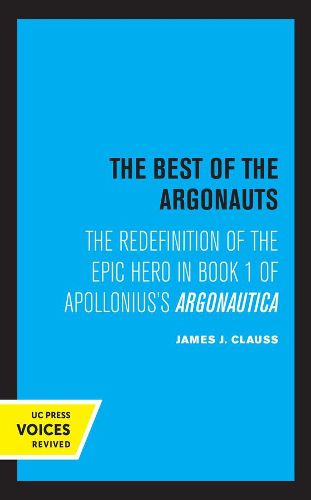Readings Newsletter
Become a Readings Member to make your shopping experience even easier.
Sign in or sign up for free!
You’re not far away from qualifying for FREE standard shipping within Australia
You’ve qualified for FREE standard shipping within Australia
The cart is loading…






This revelatory exploration of Book One of the Argonautica rescues Jason from his status as the ineffectual hero of Apollonius’ epic poem. James J. Clauss argues that by posing the question, Who is the best of the Argonauts? Apollonius redefines the epic hero and creates, in Jason, a man more realistic and less awesome than his Homeric predecessors, one who is vulnerable, dependent on the help of others, even morally questionable, yet ultimately successful.
In bringing Apollonius’ curious and demanding poem to life, Clauss illuminates two features of the poet’s narrative style: his ubiquitous allusions to the poetry of others, especially Homer, and the carefully balanced structural organization of his episodes. The poet’s subtextual interplay is explored, as is his propensity for underscoring the manipulation of the poetry of others through ring composition.
This title is part of UC Press’s Voices Revived program, which commemorates University of California Press’s mission to seek out and cultivate the brightest minds and give them voice, reach, and impact. Drawing on a backlist dating to 1893, Voices Revived makes high-quality, peer-reviewed scholarship accessible once again using print-on-demand technology. This title was originally published in 1993.
$9.00 standard shipping within Australia
FREE standard shipping within Australia for orders over $100.00
Express & International shipping calculated at checkout
This revelatory exploration of Book One of the Argonautica rescues Jason from his status as the ineffectual hero of Apollonius’ epic poem. James J. Clauss argues that by posing the question, Who is the best of the Argonauts? Apollonius redefines the epic hero and creates, in Jason, a man more realistic and less awesome than his Homeric predecessors, one who is vulnerable, dependent on the help of others, even morally questionable, yet ultimately successful.
In bringing Apollonius’ curious and demanding poem to life, Clauss illuminates two features of the poet’s narrative style: his ubiquitous allusions to the poetry of others, especially Homer, and the carefully balanced structural organization of his episodes. The poet’s subtextual interplay is explored, as is his propensity for underscoring the manipulation of the poetry of others through ring composition.
This title is part of UC Press’s Voices Revived program, which commemorates University of California Press’s mission to seek out and cultivate the brightest minds and give them voice, reach, and impact. Drawing on a backlist dating to 1893, Voices Revived makes high-quality, peer-reviewed scholarship accessible once again using print-on-demand technology. This title was originally published in 1993.